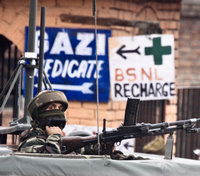With the global spotlight unwaveringly focused on the momentous changes in the Arab world, subtle shifts taking place in another strife-torn Muslim-majority region in Asia have escaped the world's attention. Jammu and Kashmir, the object of a longstanding territorial dispute between India and Pakistan, has been ravaged for the past two decades by a violent, Pakistan-backed Islamist insurgency that has exploited popular grievances among Kashmiris. But almost a year after turmoil in urban Kashmir led to the deaths of 112 unarmed civilians in police actions last summer, the situation has been completely peaceful this year.
But there is more to the story than the simple lack of violence. Earlier this month, a call for a public strike by Syed Ali Shah Geelani, the hard-line patriarchal separatist leader at the forefront of last year's anti-India protests, evoked a feeble response in Kashmir. Then, for the first time ever, the European Union delegation canceled a scheduled meeting with Geelani, after Geelani led Friday prayers at a Srinagar mosque to pay "respects" to the slain al-Qaida chief, Osama bin Laden.
An even bigger snub to the separatist leadership has come from the Kashmiris themselves. Over the past two months, Indian Kashmir has begun a three-month-long, 16-phase process of local elections, the first in a decade. And in open defiance of the separatists' instruction to boycott the state-organized polls, more than 80 percent Kashmiris have turned out to vote. More surprising still, almost 90 percent of the electorate in the separatist stronghold district of Kupwara voted during the first round of polling, and the trend has been surprisingly similar in the separatist bastions of Badgam and Srinagar.

